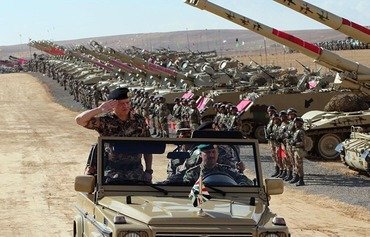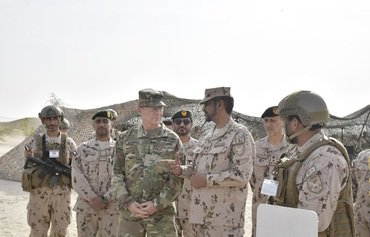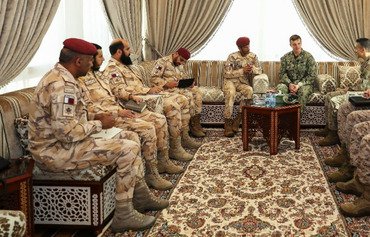Joint military exercises that involve the armies of the Middle East seek to strengthen co-operation between and among allied forces in the face of regional threats, military and Iranian affairs experts told Al-Mashareq.
Last month, Jordanian and Emirati armies took part in the "Solid Constants/1" drill, which affirms the full co-ordination that exists between Gulf Co-operation Council (GCC) member states and the kingdom, they said.
The joint exercise sought to improve co-ordination between the two armies to achieve the highest degree of discipline and precision, especially with regard to aerial transportation and the swift movement of troops via land and air.
The drill sought "to achieve the highest levels of co-ordination through a joint command to allow for unhindered, quick and smooth intervention in emergency situations", said Abdullah al-Ameri, who is retired from the Emirati forces.
![Jordanian army officers and soldiers take their seats inside a military plane during a recent drill with the UAE. [Photo courtesy of the Jordanian Armed Forces]](/cnmi_am/images/2019/07/12/18754-Jordan-military-transport-600_384.jpg)
Jordanian army officers and soldiers take their seats inside a military plane during a recent drill with the UAE. [Photo courtesy of the Jordanian Armed Forces]
![This UAE military plane transported Jordanian soldiers to take part in a joint exercise. [Photo courtesy of the Jordanian Armed Forces]](/cnmi_am/images/2019/07/12/18755-Emirati-military-plane-600_384.jpg)
This UAE military plane transported Jordanian soldiers to take part in a joint exercise. [Photo courtesy of the Jordanian Armed Forces]
![Emirati army officers and soldiers greet their Jordanian counterparts before the start of the Solid Constants/1 military drill. [Photo courtesy of the Jordanian Armed Forces]](/cnmi_am/images/2019/07/12/18756-Emirati-army-officers-600_384.jpg)
Emirati army officers and soldiers greet their Jordanian counterparts before the start of the Solid Constants/1 military drill. [Photo courtesy of the Jordanian Armed Forces]
"It is not the first time that Jordanian troops have been transported to the UAE by air and vice versa, using the most advanced means of military air transport to allow for the optimum use of time," he told Al-Mashareq.
He stressed that this is critical as time is the "the most important factor in repelling or responding to potential security or terrorist threats".
Facing a common threat
The armies of GCC states and their allies "are distinguished by their advanced training and discipline, which is the first line of defence against any potential threats", al-Ameri said.
These threats primarily come from Iran's Islamic Revolutionary Guard Corps (IRGC) and allied militias and proxies elsewhere in the region, he said.
But the IRGC's regional affiliates are "disparate groups of scattered mercenaries that are ineffective in executing rapid collective movement", he said, noting that they also lack the "discipline and precision" of the regular armed forces.
They also lack funding, he added, pointing out that the armies of the region are now equipped with the most advanced logistical equipment and vehicles that enable them to excel in executing troop movements and setting up positions.
The armies of the Middle East face a common threat in the IRGC and its affiliates, said military expert and terror group specialist Yahya Mohammed Ali.
"Joint training has become crucial and essential for communication between the armies to achieve the highest levels of readiness, as one army united under one operations room," he told Al-Mashareq.
Bilateral training drills support collective regional exercises to achieve the desired harmony between the participating armies, he said, noting that it is not possible to predict where or when a security threat might occur.
Readiness in terms of rapid movement and co-ordination between militaries will be a point of strength, he said, while the adversary "lacks the speed" to quickly deploy military forces or logistical support.
'Advanced training and discipline'
It is not possible to compare the Jordanian and Emirati armies with the IRGC and its affiliates, said Iranian affairs researcher Sheyar Turko, who specialises in IRGC-affiliated armed groups.
"Both the UAE and Jordan place utmost importance on discipline during the training process, and the training leads to precise execution as a natural result, making discipline a common characteristic of the two armies," he said.
This is in contrast to the IRGC and its militias, whose actions appear to be arbitrary, he said, no matter how much the Iranian media aggrandizes their training and preparation.
"Co-ordination between the [IRGC's] affiliates is virtually non-existent," he noted, "whether due to the lack of joint training between them in general or the social differences that characterise each of them".
For this reason, Turko said, "the IRGC is forced to appoint Iranian officers to lead the non-Iranian armed units to ensure the minimum level of communication between the commands".
Funding also plays a role, he noted, as the financial support IRGC-affiliated militias used to receive has been cut off or at least reduced to a minimum, while both the IRGC and its affiliates lack the advantage of modern equipment.

![Jordanian and Emirati soldiers take part in the Solid Constants/1 joint military drill in June. [Photo courtesy of the Jordanian Armed Forces]](/cnmi_am/images/2019/07/12/18753-Solid-Constants-drill-600_384.jpg)






